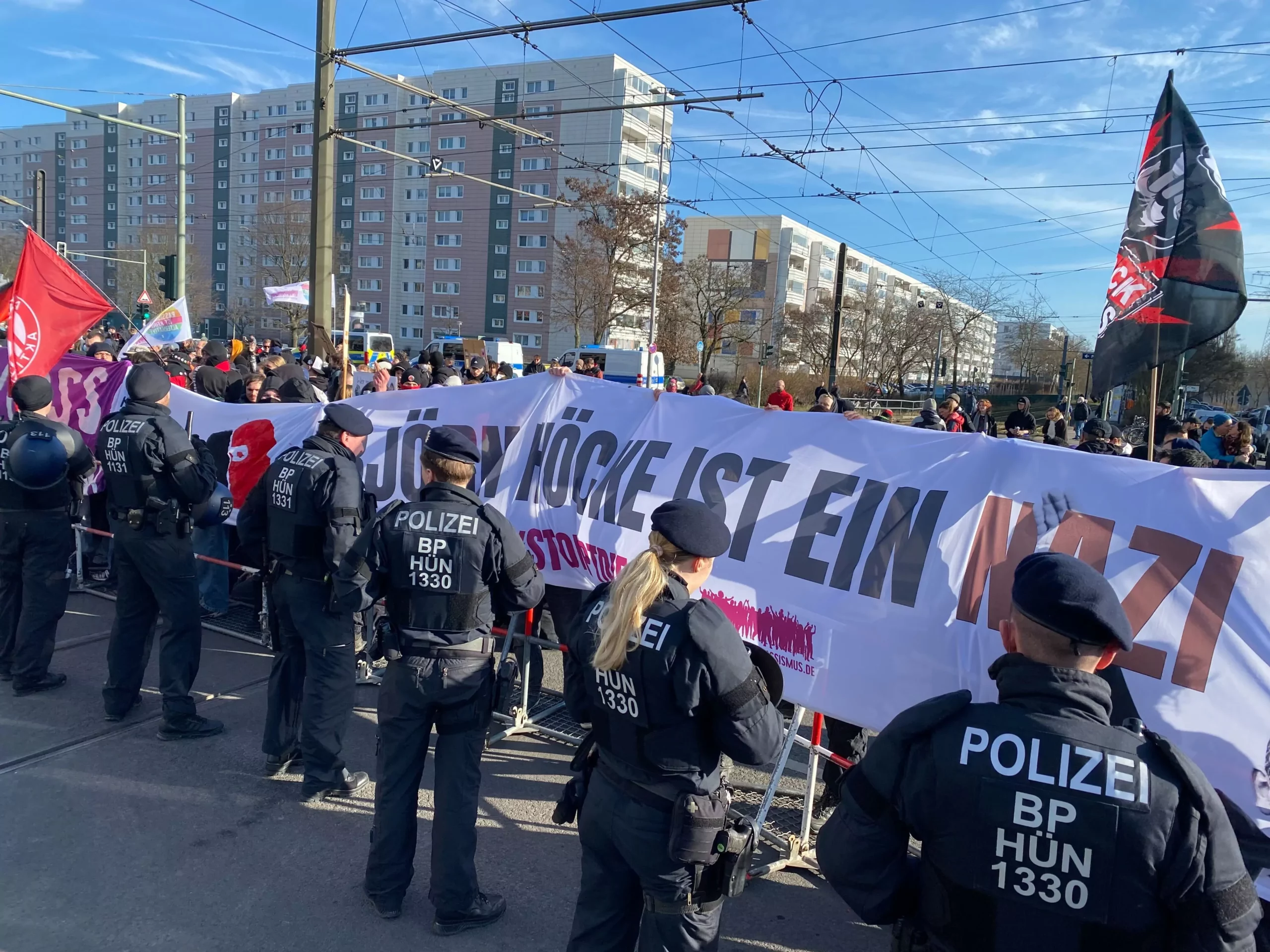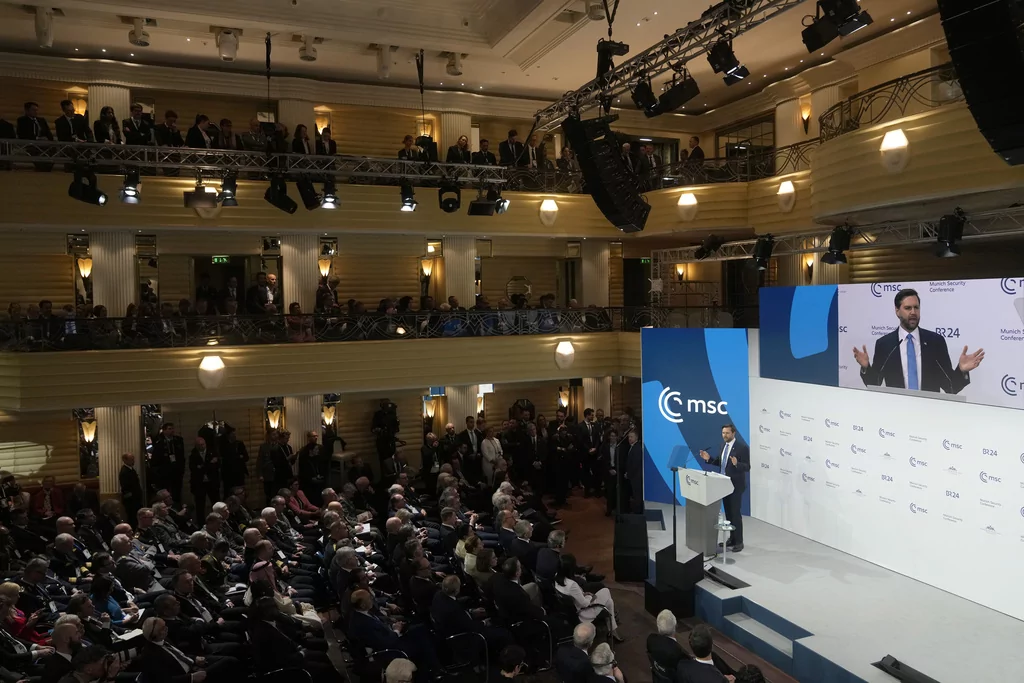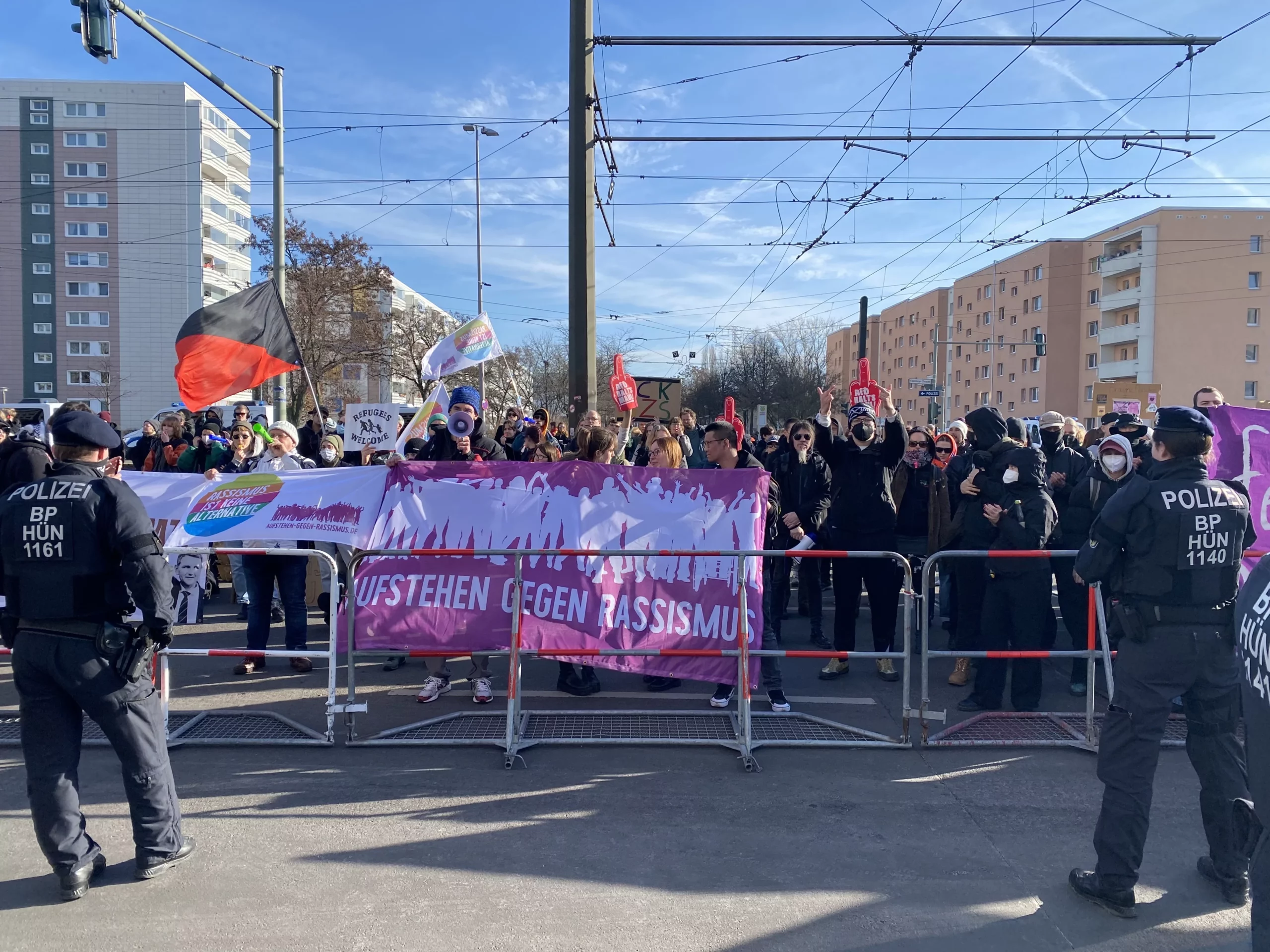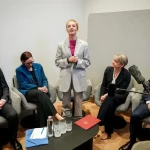
BERLIN — Everyone in German politics seems to want the “Nazis out,” but no one can agree who the “Nazis” actually are.
The Alternative for Germany party held a final pre-election rally in Berlin on Saturday in the Linden-Center shopping district. The hundreds of supporters in attendance were surrounded on multiple sides by an equal number of left-wing activists attempting to drown them out with horns and organized chants.
The narrow gap between the warring political groups was filled with dozens of stoic police officers in berets and bullet-proof vests, clustered in groups and forming human walls along the fence dividing the parties. Private security hired by the AfD wore yellow fluorescent jackets and guarded the backstage area.
The AfD — the party currently occupying second place in German election polls with 22% support — boasted four party officials who did their best to ignore the cacophony coming from their detractors, even as AfD supporters taunted the antifa gathering by displaying the German flag and posters of party leader Alice Weidel.

Disrupters carrying communist flags, foam middle fingers, and hand-made antifa banners denouncing the AfD as “Nazis” attempted to shout down each speaker by yelling and blasting music from their designated protest area just a stone’s throw away from the stage.
The left-wing demonstrators employed a variety of chants, but none as frequently and vocally as “Nazis raus!” (English: Nazis out!)
This sentiment — a wish to expel those Germans who are perceived as intolerant, violent, and outright malicious — was echoed from the right toward the left just as vehemently.
“We have some [foreign journalists] here. I’ve talked to some from Great Britain. There are some from Sweden, from [the] United States of America. I’ve seen some folks from Canada,” Beatrix von Storch, deputy parliamentary leader of the AfD, told rally attendees in English over the cries of the antifa protesters. “So a very warm welcome — you’ve got a very clear view on our side here. And if you want to see, look in our faces — this is love. Go over there, you will meet hate.”
The AfD supporters in attendance cheered, chanting along with von Storch the same chant lobbed at them by antifa: “Nazis out! Nazis out! Nazis out!”
Immigration is the defining issue not only of the Feb. 23 election but the entirety of modern German political discourse.
The AfD is the most hard-line anti-immigration party to gain success in the country since the end of World War II. They are seeking the immediate removal of all illegal immigrants, intense scrutiny for individuals claiming to need asylum, and an end to state-supported multiculturalism.
They are not alone in championing these goals. The Christian Democratic Union, which is currently polling in first place with approximately 30% public support, has acknowledged the growing demand from even moderate Germans for widespread immigration reform.
A long string of violent crimes committed by foreign nationals living legally in Germany has strained the nation’s decadeslong proclivity for cultural tolerance.
Just yesterday, a 30-year-old Spanish tourist was reportedly stabbed at the Berlin Holocaust Memorial by a 19-year-old Syrian refugee.
The city’s police force published a statement following the attack, stating, “According to what we know so far, especially based on statements made by the accused to the police, he has been planning to kill Jews for several weeks.”
On Feb. 13, an Afghan national legally living in Germany drove a car into a crowd of bystanders, injuring 30 people. The month prior, another Afghan migrant killed a 2-year-old and an adult during a stabbing attack at a preschool in the Bavarian city of Aschaffenburg.

The most brutal instance of terrorism-related violence occurred at the Magdeburg Christmas market in December when a Saudi Arabian man injured just under 300 people and killed six by ramming his car into a crowd of shoppers.
Ronald Glaser, a former member of the Berlin State Parliament who is running again with AfD in this election, talked to the Washington Examiner on Friday while handing out party pamphlets near Berlin-Karow station with several other AfD activists.
“Overall, illegal immigration is the most important topic to all our people. You can’t go out at night, you can’t feel safe here anymore. You have to pay much more money for the welfare state. People don’t feel secure,” Glaser said. “In this district, we have 18 places where refugees are brought and they live there — more than 8,000 people. This puts a burden on everyone’s life.”
While Berlin is as overwhelmingly liberal and progressive as most major world cities, the eastern part of the city carries a deeply entrenched grudge against communism and socialism due to its history as a Soviet territory.
Glaser and his fellow AfD supporters see room for growth in the area, drawing connections between rampant illegal immigration, a stagnated economy, and socialist political philosophy.
“In 2021, we had the last general election and it was very disappointing. We got just above 10%. So now we are above 20%, which means we’re doubling our outcome,” the candidate told the Washington Examiner. “This is very good — we are like a surfer on the high of the wave.”
AfD is rising, but it is still approximately 10 points behind the mainstream CDU, which refuses to form a coalition with its further-right rival on the grounds that “far-right” politics have no place in modern Germany.
CDU leader Friedrich Merz denounced the AfD during a four-way political debate on Sunday, even while his party promises it will adopt more moderate versions of their rivals’ immigration policies.
AfD supporters see the CDU as too entrenched in the German political machine to ever act on their stated positions. They blame CDU’s commitment to moderate policies meant to appease voters across the spectrum for the lack of meaningful conservative changes thus far.
“They copy [our positions] and they talk about doing these things, but they won’t act on it. That’s the truth,” Glaser said. “Who threw open the door of Germany? It was [CDU former Chancellor] Angela Merkel. And they did not make a break from her.”
He continued, “They are not reliable. They might make a PR stunt — they might close the borders for a week or something — but that’s not enough. We want secure borders for eternity.”
Immigration concerns are directly tied to the AfD’s secondary flagship issue, freedom of speech. AfD members say that German hate speech laws make criticism of migration policy and foreign cultures being imported into the country a crime punishable with fines or even prison.
“The topics of asylum and immigration are characterized by an ideologically-biased climate of political correctness, accompanied by banned terms and newspeak. Non-compliance leads to social stigmatization, even to job-related discrimination,” the AfD states in its official manifesto. “Such treatment of non-conformist opinions has been a characteristic of totalitarian countries, but not of free democratic societies. Negative developments in the field of asylum and immigration are not addressed in order to prevent a turnaround in public opinion.”

The AfD’s concerns are not unfounded — it is genuinely a crime to publicly insult another person in Germany. Even reposting a statement found to be “hate speech” or “misinformation” opens a social media user to prosecution, a fact that may shock U.S. citizens accustomed to strong First Amendment protections.
Police teams conducted raids on private residences earlier this week in one of the nation’s widest crackdowns on hate speech yet, seizing phones and issuing fines costing thousands of dollars.
It’s not just “hateful” rhetoric about race or religion that can result in a visit from the police.
The Green Party member currently running for the office of chancellor, Deputy Chancellor Robert Habeck, pressed charges on a Bavarian man in November of last year after the individual made a social media post calling him a professional “schwachkopf.” (English: “dimwit.”)
These are the behaviors and policies that AfD members acknowledge when they accuse their critics of being Nazis.
Glaser was among the four AfD speakers at the Saturday rally outside the Linden-Center. After his address, he spoke with foreign press near his campaign’s attention-grabbing vehicle — a repurposed firetruck emblazoned with the party logo.
Supporters who attended the rally varied wildly in age and background, but tropes familiar to conservatives across the Western world abound — acne-faced teenagers in Fred Perry hats, married couples from middle-class backgrounds who wandered in, elderly gentlemen dressed in old-fashioned suits, and girls with caked on make-up that would not look unfamiliar in New York’s Dimes Square.
A woman attending the event told the Washington Examiner that she was not interested in politics until the COVID-19 pandemic, when she felt unable to speak out against mandatory vaccinations and strict behavioral guidelines.
Another AfD supporter said he was a Green Party member in his younger years but made a sharp turn rightward when he began fearing for the safety of his children as the crime rate spiked.
Antifa — a loose affiliation of “anti-fascists” that organize locally but share imagery and tactics with fellow participants around the world — carry a silhouette similar to their counterparts in other countries: black clothing, face masks, hoodies, colored hair, and rainbow paraphernalia. Flags and signs are adorned with images of fists raised in defiance and communist hammer and sickles.
On the outskirts of the event, co-ed groups of teenagers on both sides of the fence raised their middle fingers to one another before returning to their cigarette-smoking cliques, laughing, and returning to make the gesture again.
For an American observing this tense and polarized political landscape, it may seem like an echo of the movement that resulted in President Donald Trump’s rise, fall, and return to the White House over the past 10 years.
The emphasis on deporting problematic foreign nationals, the consternation of mainstream political parties, the outrage and threats from those identifying as “anti-fascist” — there are endless parallels to be observed between the Make America Great Again movement and the AfD’s rise.
AfD members invite the comparison, expressing extreme enthusiasm for Trump’s second administration, his policies thus far, and his vision for a more nation-minded global ecosystem.
Members regularly hand out blue baseball caps with the words “Make Meinungsfreiheit [Free Speech] Great Again” embroidered on the front.
Multiple AfD members who spoke to the Washington Examiner expressed admiration for Vice President J.D. Vance specifically, who they say broke decades of enforced silence by lending them his support.
Vance made a landmark address in Munich last week that shocked the German public in which he urged the mainstream parties to end the “firewall” between themselves and the AfD, accusing leaders of suppressing the will of their own people.
“What no democracy — American, German, or European — will survive is telling millions of voters that their thoughts and concerns, their aspirations, their pleas for relief are invalid or unworthy of even being considered,” Vance said. “Democracy rests on the sacred principle that the voice of the people matters. There’s no room for ‘firewalls.’ You either uphold the principle or you don’t.”

Christian Buchholz, another former Berlin State Parliament member who now helps lead the local chapter of the AfD, told the Washington Examiner that he has listened to the Vance speech at least six times since the Munich event. He plans to listen to it again on election day.
German officials, on the other hand, were aghast.
“A commitment to ‘never again’ is not reconcilable with support for the AfD,” Chancellor Olaf Scholz said in rebuke of Vance after the conference. “I’m not going to let an American vice president tell me who I have to talk to here in Germany.”
He added that Germany would “not accept” lectures on how to run its democratic process. “Where our democracy goes from here is for us to decide,” Sholz said.
It’s not a surprise. An ascendence of AfD into the mainstream would mark a political upheaval as unprecedented and countercultural as Trump’s victory in the U.S.
The party hopes to take an axe to a long list of cultural trends dominating German politics: gender theory, state support for multiculturalism, high taxation, green energy mandates, European Union participation, tolerance for Islamic institutions, and more.
In their minds, the German nation, language, and culture are not dying naturally. The political establishment is choosing to suffocate them.
“The ideology of multiculturalism is blind to history and puts on a par imported cultural trends with the indigenous culture, thereby degrading the value system of the latter,” the AfD manifesto states. “The AfD views this as a serious threat to social peace and the survival of the nation state as a cultural unit. It is the duty of the government and civil society to confidently protect German cultural identity as the predominant culture.”
In a nation that in many ways defines itself by World War II and the atrocities it committed in that era, such brazen advocacy for the native culture inspires the antifa protests and their accusations of Nazism seen at the Berlin rally on Saturday.

If one chooses to believe the mainstream parties and antifa protesters, that means at least one-fifth of modern-day Germans are Nazi sympathizers. Such a scenario would be horrifying — and necessitate domestic and international alarm.
CLICK HERE TO READ MORE FROM THE WASHINGTON EXAMINER
If one chooses to believe the AfD, the movement is the explosive response to decades of abuse and persecution by their own government — a revolution of self-respect in the face of a political machine that no longer cares about the lives of its own citizens.
Whichever side one falls on, there is a nationwide consensus on the future Germans want — “Nazis raus!”






